Ever since my first 2 visits in 2008 and 2009, I had always wanted to take a serious fishing-focused trip in California. The biodiversity in the saltwater environments surrounding this state had a strong grip on my species-hunting mind. When plans to visit Nunavut fell flat this summer, I saw the opportunity to finally take a serious run at the species of California. This trip originally incorporated a few days of job searching and interviews. However, even those evaporated when companies are reluctant to interview someone who has not graduated. This thus left me with even more fishing time than expected.
Jul 26 – Day 1 – The start to a great journey.
My flight left YYZ at 10am. I left home early enough that I spent most of the time on the plane sleeping. By the time I woke up, we were just 10 minutes from the Grand Canyon. This was the second time I saw the Grand Canyon from the plane. I was still in awe.
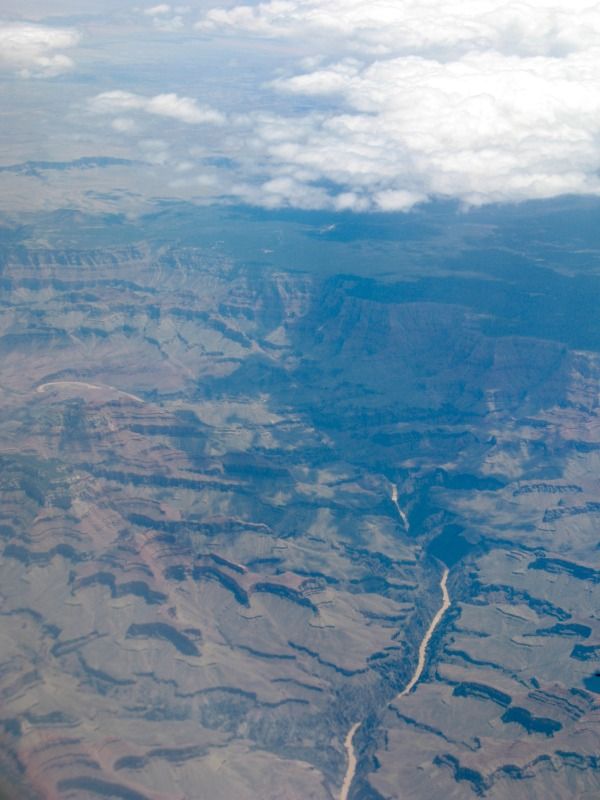
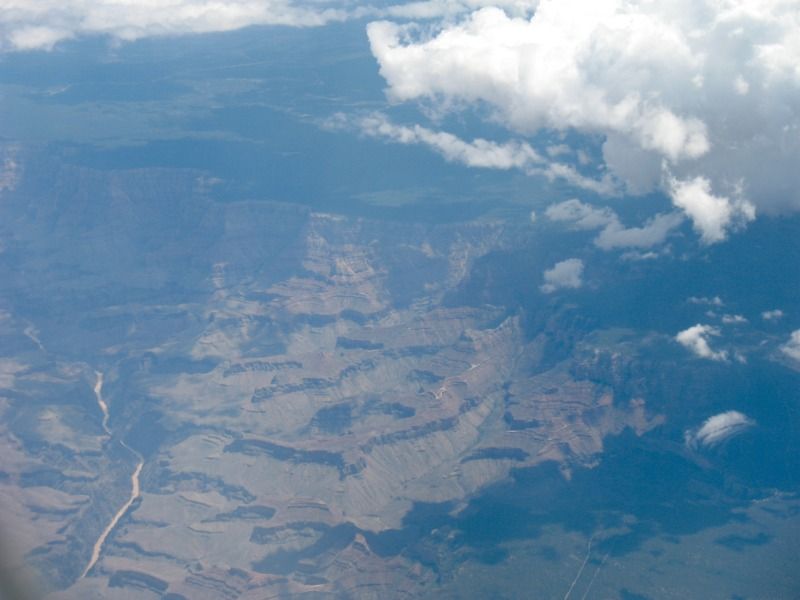
A little further past the Grand Canyon, we flew over the Mohave Desert.
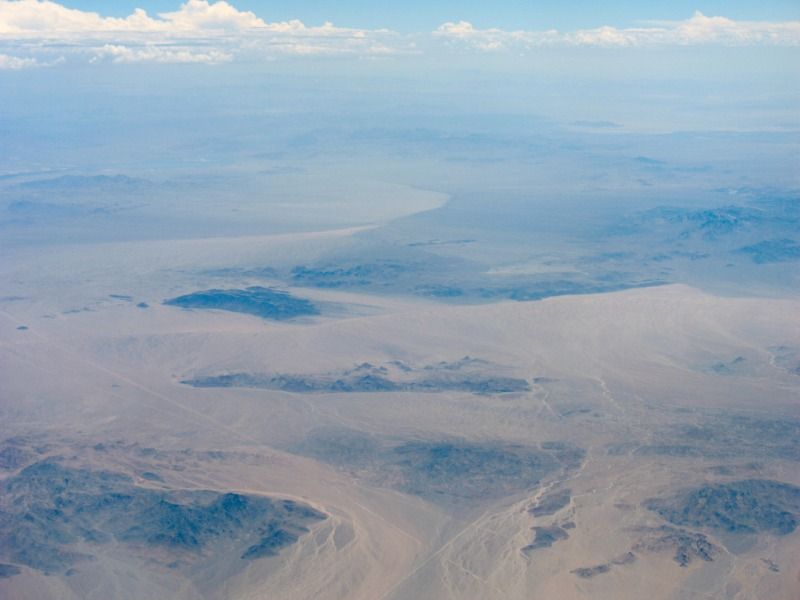
Just minutes from landing, we passed over the San Gabriel Mountains.
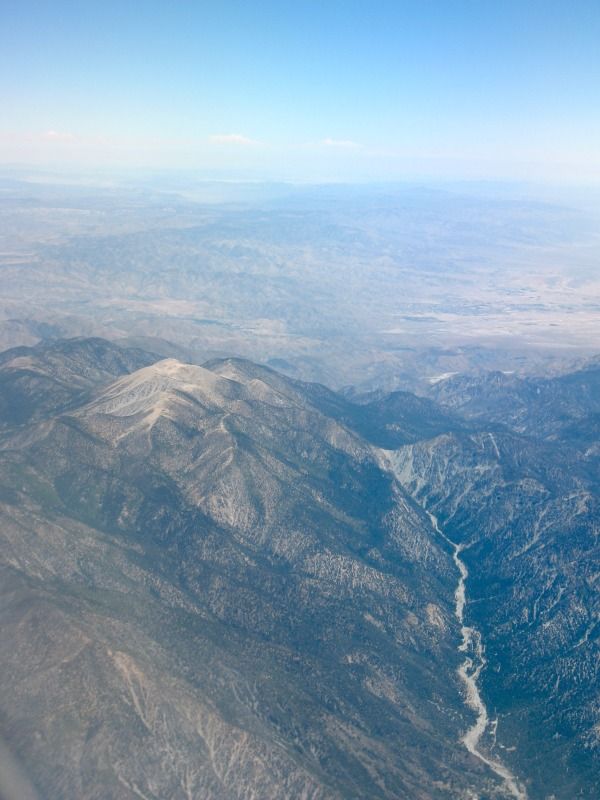
After landing, I met my aunt at the airport and we had a quick lunch before picking up my rental car. We drove to my cousin’s apartment, picked her up after work and went for dinner. I went to bed early since there was a long day ahead. I had a little trouble sleeping since the excitement of the next day’s fishing was swirling in my head.
Jul 27 – Day 2 – Bottom species hunting on the Gentlemen
I woke up today at 4:00am to arrive at Oxnard before 5:30am. With a bit of luck, I was notified a coupon to the ¾ day fishing boat, the Gentlemen, out of Channel Island Sportfishing. Having seen many reports on scsurffing.com, the Channel Islands were a series of islands to the west of Oxnard that have phenomenal bottom fishing for rockfish species and lingcod. Unfortunately, the fishing had slowed to a crawl just before my trip. Instead of fishing the Channel Islands, my captain decided to fish along the California coast. I was wondering how this would affect the variety of fish to be caught.
We had a full boat today since everyone was taking advantage of the coupon.
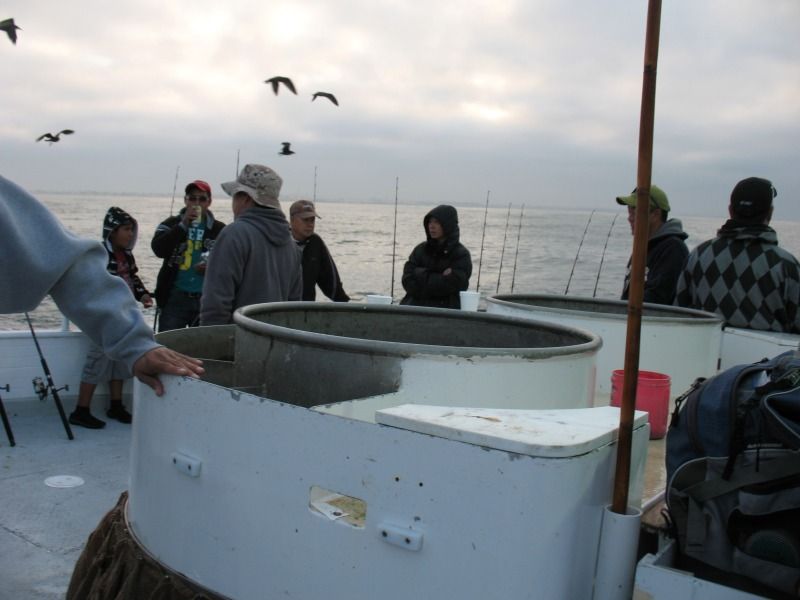
We took a 1-hour boat ride south along the coast. Finally we slowed as the captain searched the 180’ depth for rocky bottom structures that could hold fish. After a few minutes of snaking along this area, the captain drove a circle around a spot and finally asked the deckhands to drop anchor.
During the ride, I had rigged up my 7’ UglyStik Tiger rod, Saltist BG 40 reel holding 300 yards of 65lb Sufix 832 braid with a 50’ top shot of 40lb Big Game mono. I tied a 150lb swivel to the end of the 40lb mono, then tied on a dropper loop rig of 30lb mono. We were fishing fairly deep water, so I used a 10oz torpedo sinker to make sure the line was kept as vertical as possible. If the lines are drifting at an angle, this would result in endless tangles with your fishing neighbours on either side of you, or even worst the fishing people on the other side of the boat.
Although we had live anchovies on the boat, we started fishing using squid. On the first drop, I detected some small bites and set the hook. Something small was struggling on the other end which I found to be a Calico Rockfish (Sebastes dalli)! This was my first new species on this trip!
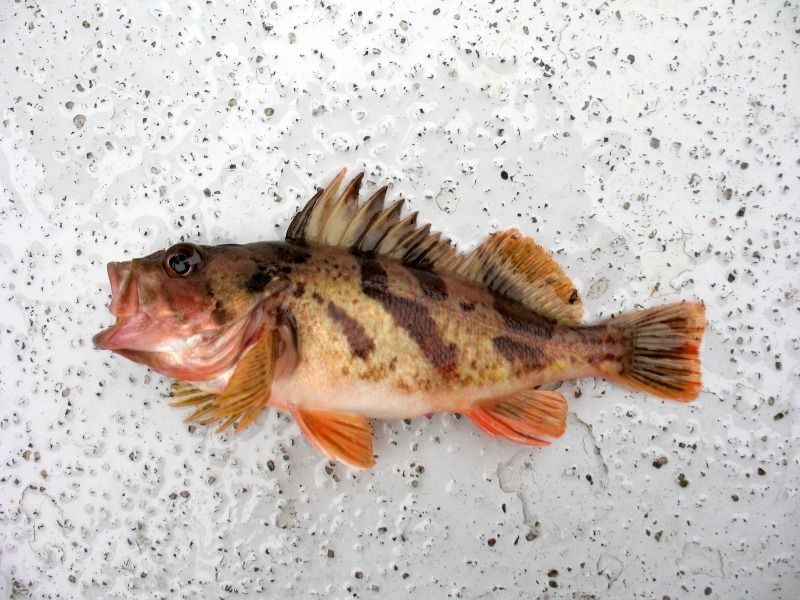
The next drop, there was another little tap. I reeled up a Pacific Sanddab, a species I had already caught on the previous trips to California. Catching these Sanddabs indicated we were on a sandy bottom.
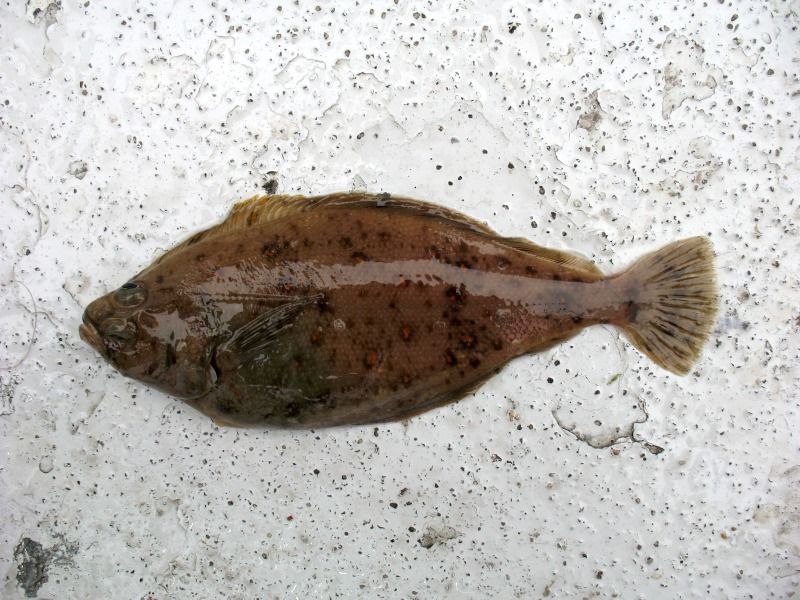
Nothing was really going on at this spot. The captain asked everyone to reel up so we could try another area.
At the second spot, my dropper loop rig was hit on the first drop! This fish fought a little more and up came a Vermillion Rockfish (Sebastes miniatus) – new species #2!
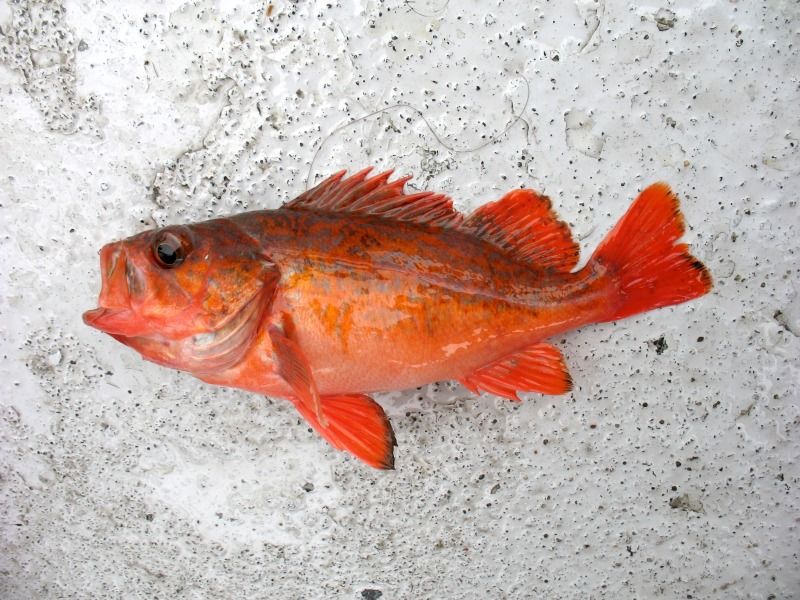
A couple of missed hits later, I set the hook on another fish. This fish looked a bit like a Vermillion Rockfish, but the white lateral line suggested it was a Canary Rockfish. However, you’ll see later that a Canary Rockfish has a dark patch on the spiny dorsal that is missing in this fish. I really don’t know how to call this fish. I’ll catch a confirmed Canary Rockfish at a later date, so I wasn’t too hasty on calling this a new species caught just yet.
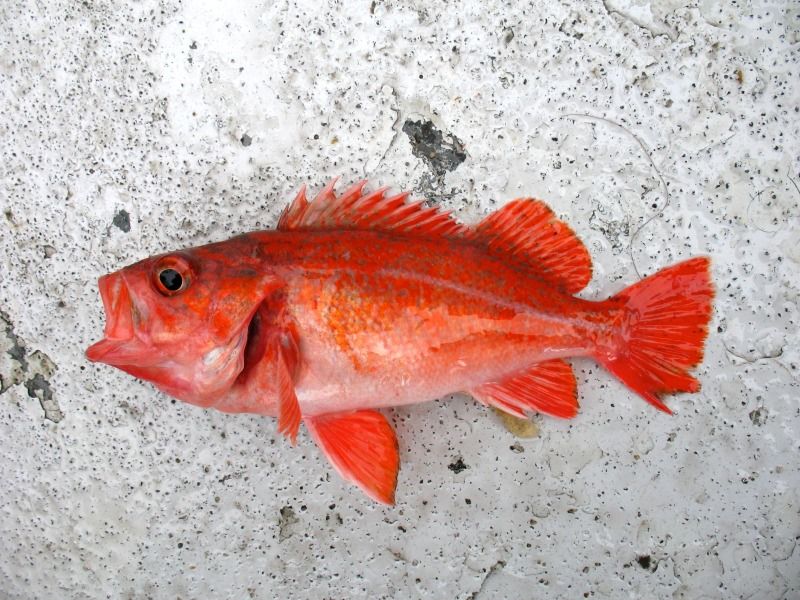
After we drifted off the spot, we readjusted anchor. The current was either really strong this day or we were just fishing on a relatively flat and sandy bottom. Whatever the case, the anchor was often slipping. A few drops later, I finally had a hit and yielded yet another new rockfish species. This was a Greenblotched Rockfish (Sebastes rosenblatti) – new species #3! This fish was especially difficult to ID. While many people on the forums suggest it was a Rosy Rockfish, I stood by my observation that there were green wavy markings on the back. A few of my pictures were examined by Dr. Milton Love and his associates (Thanks to Roy for forwarding them to Dr. Love!) Their consensus was juvenile Greenblotched Rockfish, especially these words by Dr. Love "because the green on the back seems to form vermiculations rather than distinct spots." In this particular picture (and really only in the picture), you could attempt to count the pectoral ray of this fish. There were 17 pectoral ray, which identifies it as a Greenblotched Rockfish (typically 17) and distinguish it from a Pink Rockfish (typically 18 ). Anyways, a little bit of an ID challenge for the fish nerds.
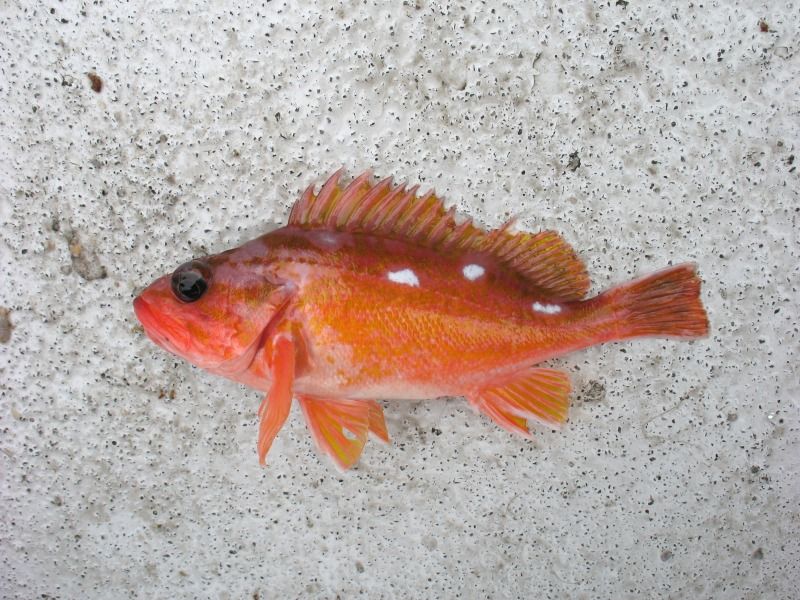
Fishing was pretty fast and furious on this stop once we drifted over a rocky spot. The next stop was another new rockfish species! This one was a Copper Rockfis. (Sebastes caurinis) – new species #4.
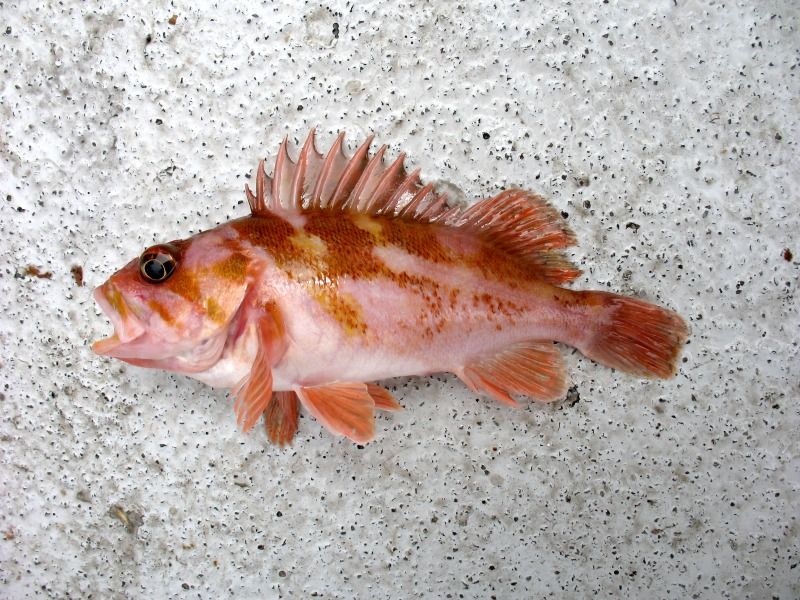
I caught a few more small Calico Rockfish and one more Vermillion Rockfish. The fishing then slowed to a stop and the captain decided to make a longer steam south of Point Mugu. We were looking to fish shallower near the kelp beds to see if there was anyone home.
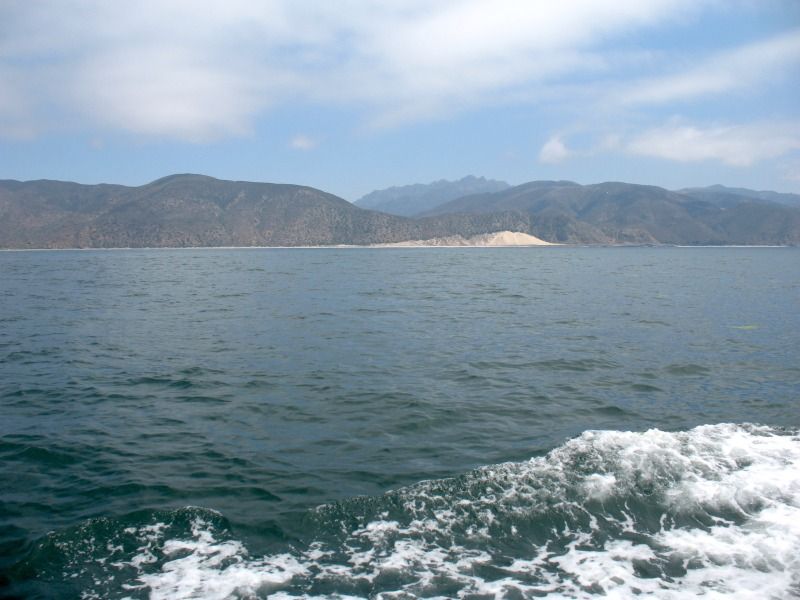
The current had now picked up a little more. I had novice anglers on the left and right of me. It was difficult to get a good drop down without having one of them tangle up multiple lines! During one drop, I hooked a fish and was reeling up to find 4 other lines tangled with mine! Luckily, I did catch a new species to make the trouble a little more bearable. This was a Kelp Rockfish (Sebastes atrovirens) – new species #5. It is different from the Brown Rockfish by the lighter olive green/brown colouring and darker mottling.
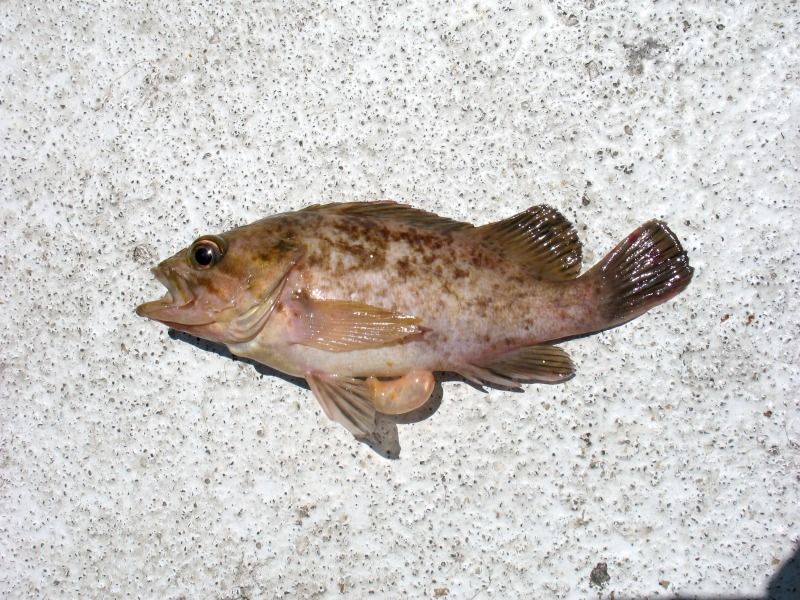
When the tangled lines were finally sorted out, I was hit and a stronger fighting fish was on the line. These Gopher Rockfish (Sebastes carnatus) fought much more than other rockfish species I’ve encountered. They were a little more fun to reel in – new species #6
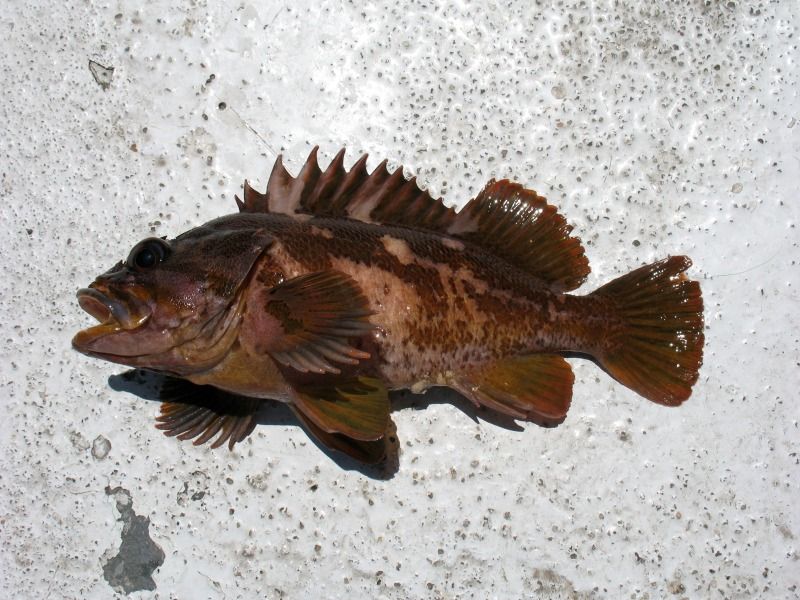
Another drop yielded a surprising catch. This species is usually rare south of Santa Barbara. I don’t know what it was doing such south of its range. I was happy to have chanced into it since I had little expectation of catching one on this trip. This was a Rainbow Seaperch (Hypsurus caryi) – new species #7 and an absolutely beautiful little creature!
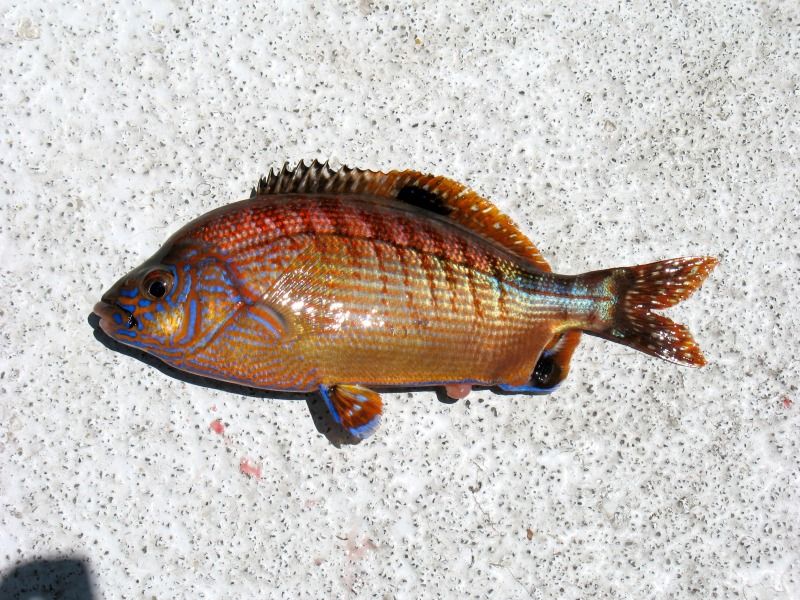
At long last, the ¾ day came to an end. The slow fishing made the day dragged on and it felt much longer than the 6 hours we had on the water. I ended the day with a half limit of 2 Vermillion, 1 Copper, 1 Gopher and 1 Rosy Rockfish. That was a decent count considering most people only had 1 or 2 keeper fish in their sacks.
I asked the deckhand to gut and gill my catch and my aunt, cousin and I had steamed rockfish that night. The Gopher Rockfish tasted the best out of all of them, with the Vermillion coming a close second. I was early to bed again since I had a long driving day ahead.
Jul 28 - Day 3 – Mountain goats on the jetty
My day started at 5am. Today, I had a long day of driving from Los Angeles to Half Moon Bay. The GPS was my best friend on this trip. I had resisted relying on a GPS for a very, very long time. I always believe it is much better to navigate by maps. However, I finally gave in on this trip since there were just too many routes to plan. My drive would take about 6 hours of continuous driving to reach Half Moon Bay. I decided to take a couple of strategic stops along the way. I started off on Highway 5 driving west through the San Gabriel Mountains and the Angeles National Forest. The landscape was quite interesting but there were nowhere to stop and take pictures on the steep and windy road. After we drop out of the mountains though, I made a washroom stop and snapped a picture back toward the mountains.

From Bakersfield to Coalinga, the landscape was mostly flat and the road was straight. There were many crop fields and cattle farms along the way. It was not uncommon to see trucks and trucks filled with fresh tomatoes this time of year. Passing through one of the few large cattle farms was rather unsightly and stinky since over tens of thousands of cattle out on the open land made quite a mess.
About 4 hours into the drive, the GPS lead me to Highway 152. This was the Pacheco Pass Highway. It was a very scenic route that I was very happy to have driven through. This picture did not do the area justice since much of the beauty was encountered on the many uphill and downhill sections of the drive with its many turns and twists.
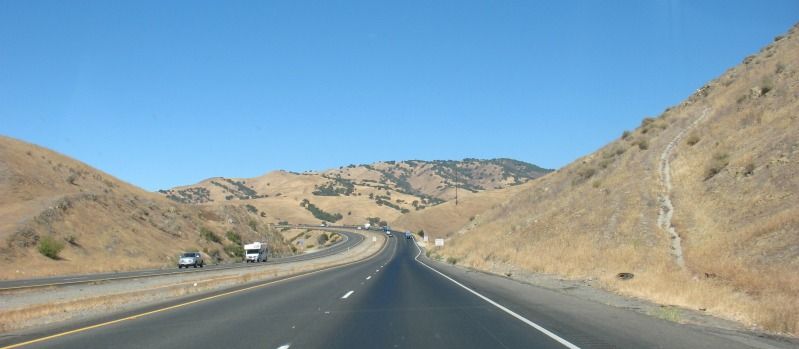
Somewhere along the way, I found a little road to pull out and snapped another picture of this rocky outcrop.
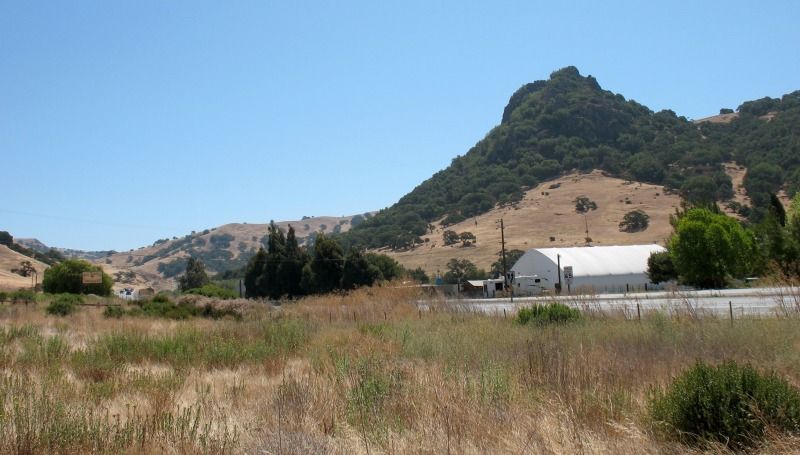
Once in Gilroy, I made a longer lunch stop. My journey then headed north on Highway 101, onto Route 85 and finally Highway 280. At long last, I turned off the highway onto San Mateo Road west toward Half Moon Bay. It was very interest that toward the coast, the cloud cover built and fog enveloped the road as we climbed. There was a lot of traffic for some reason. I later found out that just across the peak, the weather had cleared and it was a beautiful beach day for NorCal. I didn’t know this when we started our descent down the other side of the mountain.
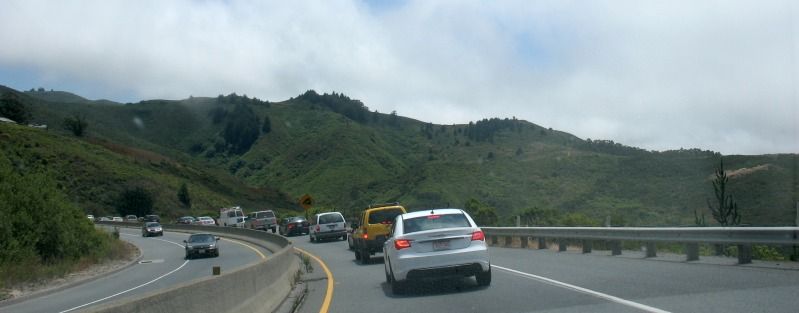
I finally arrived at Half Moon Bay at 2pm. I was a little early and two of my friends had not arrive yet, so I took a few pictures of the area.
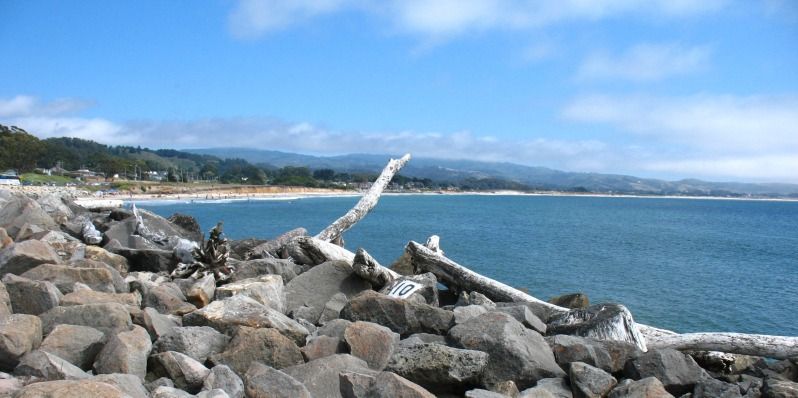
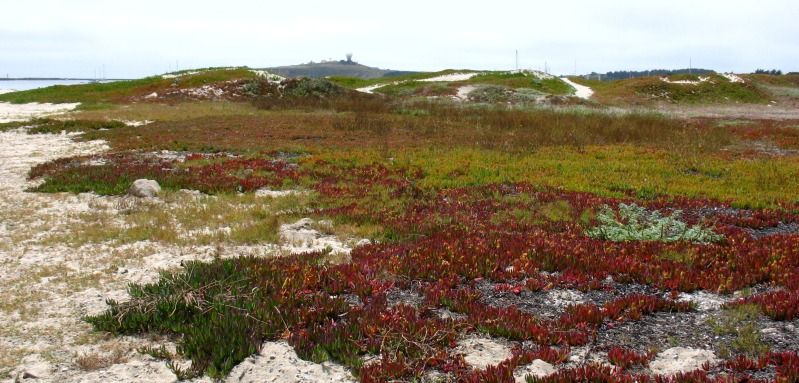
At about 3pm, Adam finally arrived. I had a chat with Adam to discuss our game plan. I had left the gear at the car since I was uncertain what I would need. So while I went back to the car to grab my rod and reel, Adam attacked a jetty in the area that we would be fishing on.
The jetty was just under 4000 feet long. It was a long and slow journey across the large boulders. We were planning to fish near the end of the jetty so the long hike was good for my heart LOL. The rocks for most parts were dry and it was easy skipping from one boulder to the next. I did have a scary moment when I lost grip on one stride and almost fell forward. When I arrived, Adam was already well into fishing. Since I didn’t have any suitable lures, he gave me a 6” Big Hammer swimbait and a 1oz darter jig head. We would cast these as far as possible and retrieve it back toward the jetty with a steady retrieve. It was important to crawl these lures up the angled façade or the jetty rock since lingcod and rockfish often hid amongst the rocks.
We fished these for a while without any attention from the fish. Soon, Teng also arrived and we decided to switch up our presentation. Teng rigged me with with a dropshot rig using a length of pencil lead, a weedless hook and a white jerk shad. Both Teng and I fished this dropshot while Adam switched to a 3/4oz darter head and a 4” Berkley Gulp! Shrimp. With the dropshot rig, we would slowly and methodically work the bottom crawling it back toward the jetty then dropping it between crevices.
It was not too long after the switch that Adam hooked into a small Lingcod. Adam said this was his confidence bait. A while later, he found a school of Black Rockfish and caught a couple. Teng had a few hits on the dropshot while I had nary a hit. At about 6pm, Adam had to call it an evening. He gave me a few of the Gulp! Shrimp and wished me all the best. I really did need some luck!
Teng and I fished closer and closer to the end of the jetty. As Adam instructed, I casted the lure out and slowly popped the jig back to the jetty. On one cast, my lure stopped dead on the drop and I set the hook. We were fishing pretty buttoned down drag since we wanted to pull fish out of the rocks quickly, especially the Lingcod. My fish was hooked far out from the jetty and I had a feeling what it could be. It was indeed a Black Rockfish (Sebastes melanops) – new species #8.
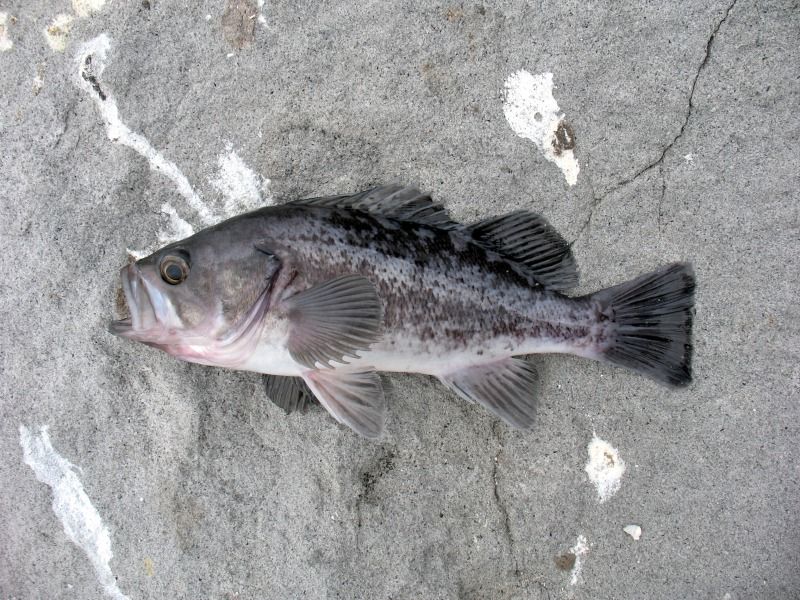
It felt pretty good to shake the skunk!
A little while later, I found the school again and caught another Black Rockfish. I was really hoping for a Lingcod but the fish would not reveal themselves. Just before dark, Teng finally shook the skunk with a Brown Rockfish using the dropshot rig.
By the time we got off the jetty, it was already 9pm. Teng and I visited a restaurant for fishing food that he must have every time he fished here…Popeye’s! Teng treated me to a great Popeye’s dinner and left me with a number of lures and soft plastics to try the next day. Thanks to Adam and Teng for showing me how to fish the jetty! We parted ways after dinner and I made my way to my motel in Redwood City. It was a little more rundown than I had expected, but I was only really staying there for two nights. At least I had a decent bed to sleep on. I was in bed by 12am since I would challenge the another jetty early next morning.
July 29 – Day 4 – Single day triple header
At 5am, the alarm sounded off. I rolled out of bed, looked out the window to see darkness still, and went back to bed. At 6am, I finally got out of bed and headed to the nearest McDonald’s. It is possible to have a half decent breakfast at McD’s!
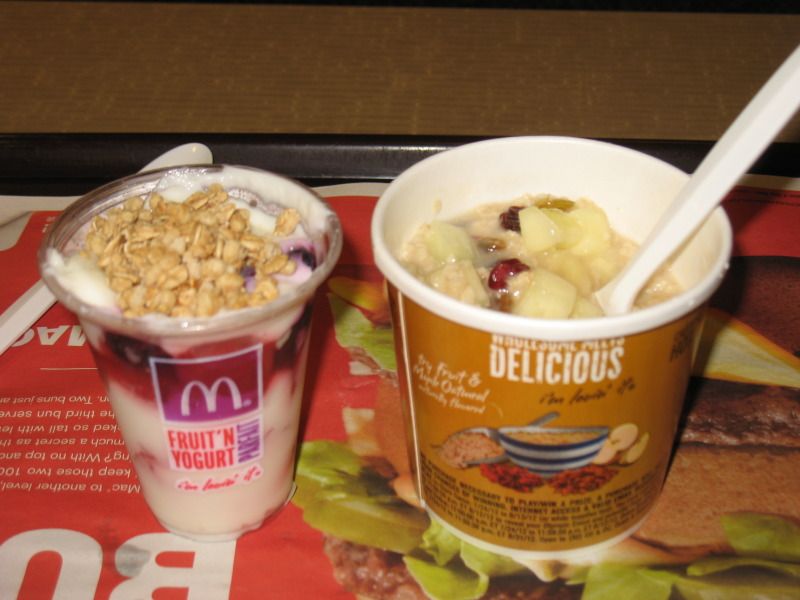
It was cloudy at Redwood City where I stayed. As I drove toward Half Moon Bay, it was downright foggy! Traffic was much lighter this morning than the afternoon before and I could take it easy navigating through the twists and turns. At last, I arrived at Half Moon Bay Sportfishing where I purchased a few more 3/4oz jigheads, a bag of Gulp! Shrimp, and a 1lb of frozen squid. I hoped that it was all I’ll need for the day of fishing.
The morning was cool and moist. Everywhere was drab except for these yellow flowers.
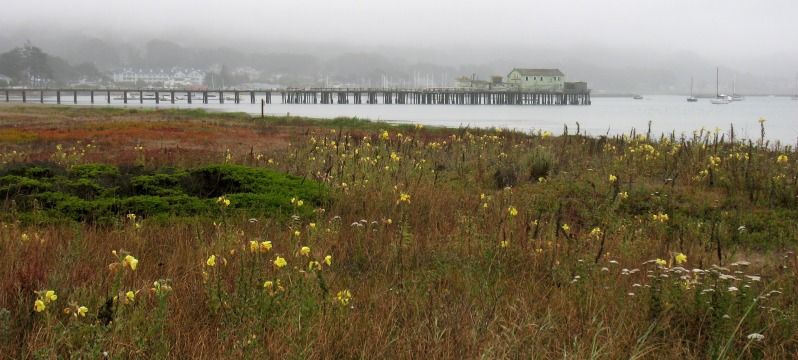
Along the way to a jetty in the area, I passed by this interesting rock maze.
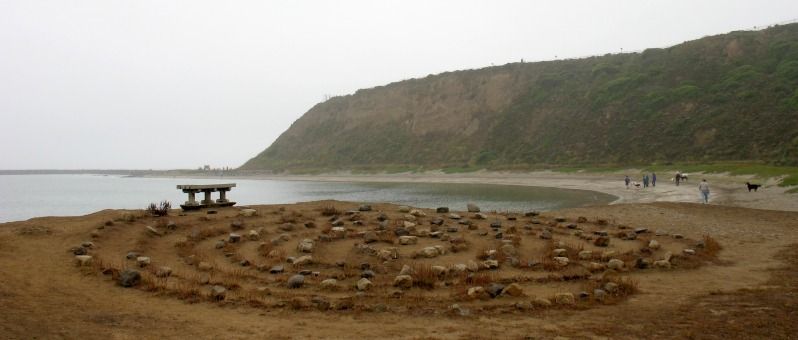
I was a little apprehensive about hiking the jetty that day. Firstly, all the rocks were wet from the misty rain. Secondly, I had a backpack with probably 25lbs of gear that could easily shift weight and cause me to lose balance. Thirdly, I was hiking out on my own with only a few people walking their dogs at the beach. As if it wasn’t bad enough, the swells and wind was up on the ocean side of the jetty. This hike could turn out really bad!
I was determined to find my lingcod. That desire seemed to suppress the caution and drove myself to take risk. Truth be told, I re-evaluate my decision to hike out multiple times along the way, often stopping and turning back to see the slow progress I was making. When I reached halfway out, I finally told myself that I had gone too far to turn back now.
It was just maybe 5 minutes after the halfway point that I stepped on a rock with some wet, slippery bird droppings that made me fall. Luckily, I had stuck to the harbour side of the jetty where the rocks seemed less jumbled. My heavy backpack was actually a blessing in this case as I was pulled by gravity backwards instead of forward. The backpack also cushioned my fall against the rock and protected my spine. I did, however, scraped up my right arm pretty nicely. I was trying hard to protect my rods against the rocks that my arm smashed against the rocks.
After falling, my progress slowed even further. At the middle of the jetty, the rocks were terribly covered by bird droppings and it was extremely difficult to navigate. My hands had no choice but to land on wet droppings to brace against falls. Man, did it ever stink out there!
At long last, I made it to a spot that Teng had suggested. The waves were crashing much too high, and the rocks much too slippery, for me to fish the ocean side where the lingcod could be found in the deep water. Instead, I fished on the harbour side where the water was at least calm. I found a spot where I could wedge myself against two rocks in case my footing slips. If I did fall, I would just drop deeper into the crevice instead of into the water.
The areas next to the jetty had a healthy growth of kelp. It created habitat for fish, but also presented a challenge to my fishing. I made a few casts straight out of the jetty and jigged the lure back. After a while without any action, I questioned whether it was better to cast parallel to the jetty and work the lures back. Most of the rockfish and lingcod are found hiding to ambush within the cracks between boulders. Since I can’t really move and cover water, this was really my only choice.
I placed a few of casts to work along the jetty. On one cast, I felt my jig being picked up and set the hook on a fish determined to run back to its hole. I had my drag locked down and simply pull back with my rod. Using a short pumping technique, I managed to get to fish to shore quickly. At first, I thought the fish was a lingcod at deep colour. However, it soon revealed itself to be either a Olive Rockfish or a Yellowtail Rockfish. I had no way of getting down to water level, so lifting the fish straight up was my only option. Once at hand, I counted the 9 soft anal fin rays to find it was an Olive Rockfish (Sebastes serranoides) – new species #9. I was happy that the long, difficult hike was reward by at least a new species!
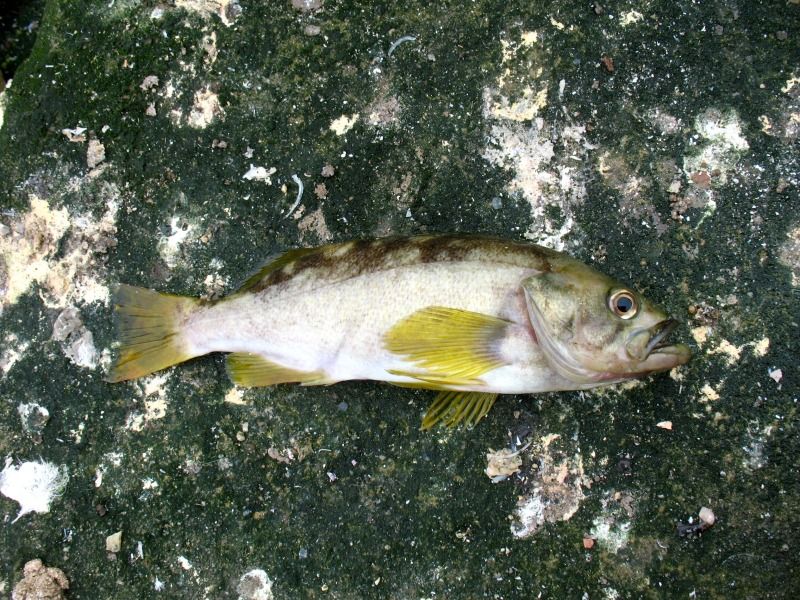
A few casts later along the same area parallel to the jetty, I hooked another rockfish. This one was a Brown Rockfish that unfortunately flopped off the hook into a crevice. It was way too deep for me to reach. I tried for 10 minutes trying to snag it with a large hook so I could get it back into the water, but all the attempts failed. Eventually, with a stroke of luck, the fish somehow flopped into another crevice that opened to the water below. I heard a splash and hoped that I will eventually find open water again.
As the tide dropped the current slowed and the bite seemed to die off. It was getting toward 12pm and I needed to get off the jetty. By now, the fog had lifted and a little bit of sunlight actually peaked through. The rocks were drying quickly and I was making relatively quick progress back toward shore. Halfway back to shore, I saw a man poke poling. I had squid with me and I was planning to poke pole on one jetty. Seeing his activity, I went down to chat with him to see if he had any success. He had a Kelp Rockfish in the bucket and he said he caught a couple of smaller rockfish.
I set up my 7’ musky rod with 30lb mono and a #8 hook. I pinched a splitshot on the line about 6” from the hook. Using a 2” strip of squid, I dropped this bait down to the larger holes between boulders. The length of line was only 12” from the rod tip to the hook. While poke poling, you would point the rod straight down toward the hole and dangle the baited line in the water to wash in the surge.
At the beginning, I was not having any success. I saw the man caught a Monkeyface Prickleback. I walked over again to compare his rig with mine and asked if I was doing anything wrong. Apparently, the fish are found in much smaller holes than I had thought possible. He was checking holes that were about the diameter of a soda can! Sometimes he would even drop his bait into even small cracks.
I started to look for small holes. After what felt like 10 or so empty holes, I finally had a small bite at last! I missed the hookset and the bait was torn off the hook. With a new baited line, the current washed the bait seductively in the surge but the fish seemed to have ventured off.
About another dozen holes later, I felt a tap and pulled up quickly. I saw a small fish came to the surface but fell off the hook the moment it was in the air! Darn! I tried with a fresh piece of squid but this fish swam off too.
About another half dozen holes later, I found another small tap on the line. This time, I let the bait sit there to be swallowed before setting the hook. At long last, I finally landed a small fish. At first, I thought it was a small Cabezon. After a little suggestion by a friend, I found that it was a Woolly Sculpin (Clinocottus analis) – new species #10.
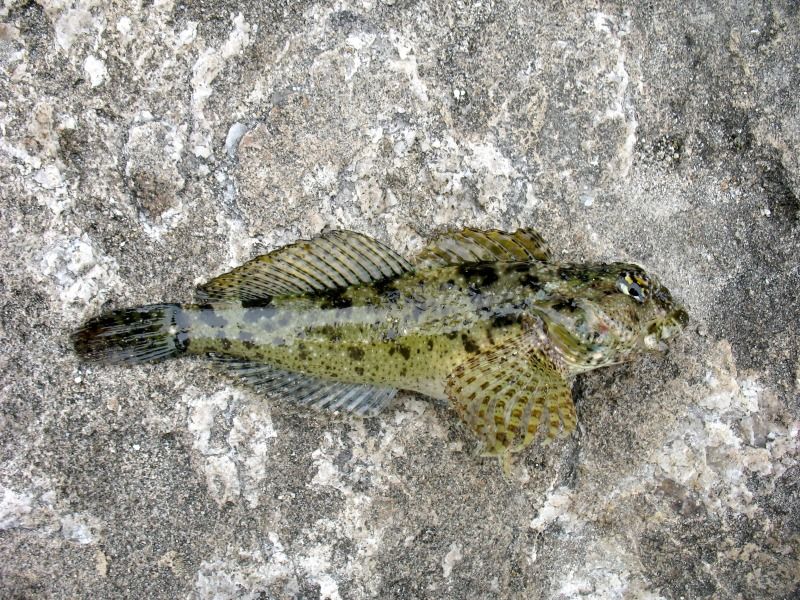
I was really hoping to find a Monkeyface Prickleback. Poke poling the rock crevices was the best method to find them. I was running out of time as I had to leave Half Moon Bay by 3pm. It was already 2pm and I still had half the jetty to hike. As I worked my way hole by hole slowly back toward shore, I caught another Woolly Sculpin about the same size. With about 15 minutes left before my 2:30pm deadline, I finally found a fish inside a hole that bit a little different. The bites felt more determined and aggressive. I lost my squid on the first bite and on the second bite. With a third baited hook, I let the fish grab the bait a little more before setting the hook. I thought I had set the hook well and felt the fish on the line, but the fish again stripped my hook bare. I didn’t know if the fish would bite again, but I dipped the squid into the hole and left a lot of slack in the line. I was about to soak the bait for at least 30 seconds before setting the hook. However, as the bait sat there for 15 seconds, I could see the line tightening as the fish swam back to the hole. I immediately pulled back and I could feel a lot of resistance against the line. The fish was most determined to back into its hole. I had an idea what this fish might be, and my guess was correct! This was a Monkeyface Prickleback (Cebidichthys violaceus) – new species #11. Most people find them ugly…I find them pretty neat actually.
Most of its reddish colour wasn’t captured in the photograph, but they had a nice rusty red on the margins of the fins.
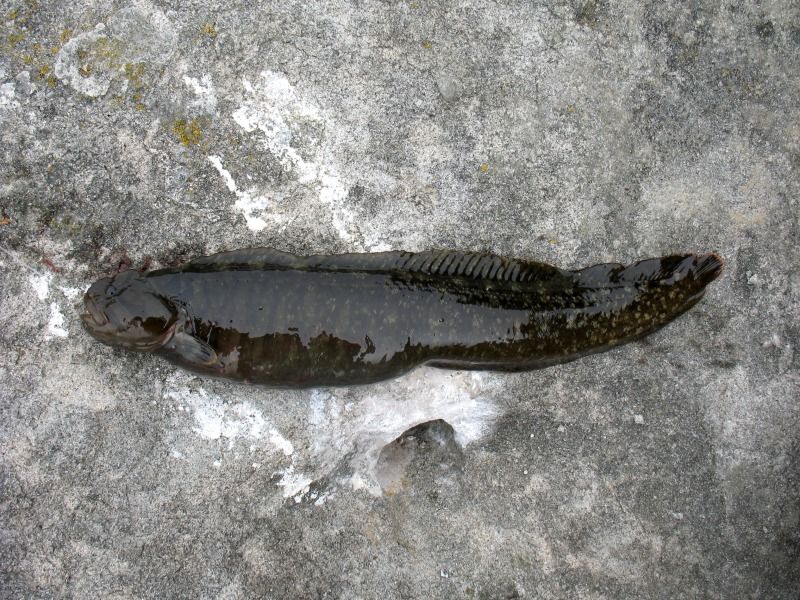
With the target species captured, and time seriously dwindling, I had to end the session.
I got back to the car at 3:30pm. I had about an hour drive ahead of me toward Rohnert Park where I would meet with Eric at his house. The one hour drive turned into a 2 hour nightmare as rush hour traffic clogged city streets and the Golden Gate bridge which I had to cross. I felt terribly bad that I had arrived so late at Eric’s house, but he assured me that it was okay, and the fish would be waiting.
From Eric’s house, he drove about an hour to reach Tomales Bay. I don’t really know where exactly it was that we fished…but I don’t share location information on the public forum anyways. Wherever this spot was, it was as predictable as clockwork.
Eric showed me his simple rig for Bat Rays. It consisted a dropper loop that had a hook loop about 3-4 feet from the sinker. To the hook loop Eric attached about 8” of wire leader and a #6 circle hook. Since the current was a bit strong, we put on a 5oz bank sinker to ensure our rig would stay on bottom.
We put a whole squid on the hook. Eric had some Spider Thread that we wrapped around the squid to secure the bait a little better on the hook. Eric said we really didn’t need to cast far as the tide was incoming. I placed my bait about 60 yards out and then wedged the stainless steel butt of my custom 12’ surf rod against a rocky spot that was Eric’s favourite rod holding spot. I had this 12’, 3-piece rod customized with reflective tape, a bell holder and a stainless steel rod by a friend in Hawaii to use as a dunking rod. I had never caught a fish on it. Most of the time this rod was used to fish an octopus leg or a live reef fish for bonefish or trevally in Hawaii. It had yet to be bit and yet to be tested.
It was maybe 5 minutes after my bait was soaking that my Shimano Baitrunner 4000 started a steady scream. I had noticed that a large mass of eel grass had bumped into my line a minute ago and I thought the mass might be dragging my line. However, it was very quickly realized that the line was actually moving away from the mass of grass. This was a fish!
I grabbed the rod and cranked on the handle to engage the reel. At that moment, the rod doubled over and we had a tough fish on our hands! The first run was nothing short of spectacular and I thought the fish would never stop until it reached the other side of the bay. About 150 yards of line dumped off my spool before the fish cuts back and I could regain some line. The fish then swam to our left on another long run. With each run, the distance decreased. However, when the fish stopped running, it felt like I was reeling in a large sea anchor! At long last, I saw the tips of the wings of this fish. From afar, it didn’t look too big, but Eric was certainly excited about this size of this fish. I had guessed the fish to be in the 30” class. Eric usually net his fish and nudge it toward shore. This fish barely fitted into the net and we barely pushed it up on shore.
What a wonderful specimen for my first ever Bat Ray (Myliobatis californica) – new species #12! This fish had a 43” wing span and an estimated weight of 40-50lbs. I lifted it just high enough for a picture.
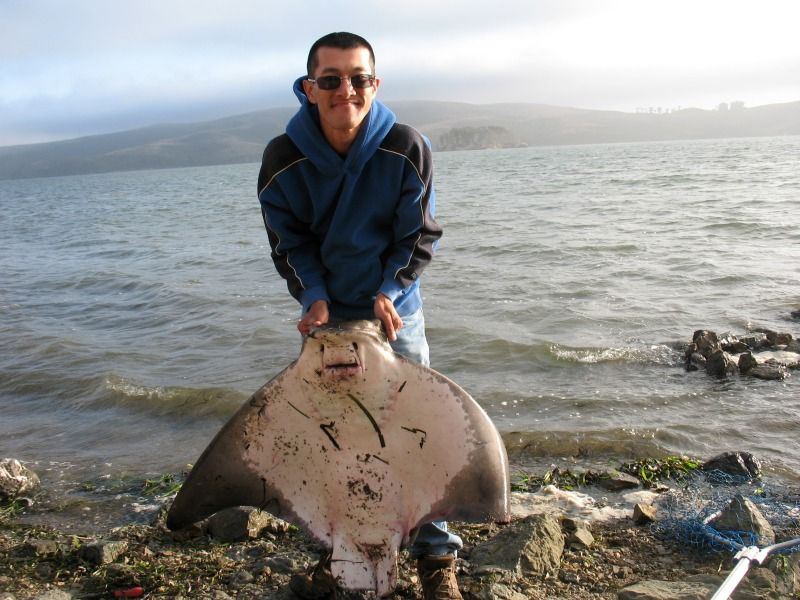
This fish kicked my butt! My rod performed great, but the longer length and the parabolic nature meant I often had to squad down and “boost ‘em” to gain any leverage on the fish. It might work as an ulua rod…but this was certain a little too parabolic for bat rays.
I sent out my rig again with a fresh squid. I had the next series of casts plagued by sea grass masses that were now washing toward shore on the incoming tide. When I finally had a good soak, I missed a good hit that pulled out some line then dropped the bait.
I decided to put down the rod and took a scenic shot.
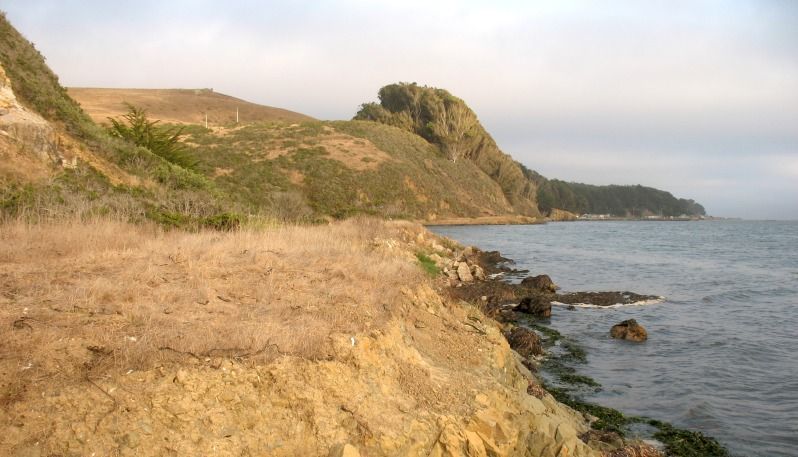
Eric finally hooked up on his 9’ UglyStik and handed the rod over to me. He said I should tug on every bay ray we hooked LOL.
This fish ended up being a cute little baby that was subdubed very quickly. It was maybe 18” across. Cute and not a lot of work. I like it.
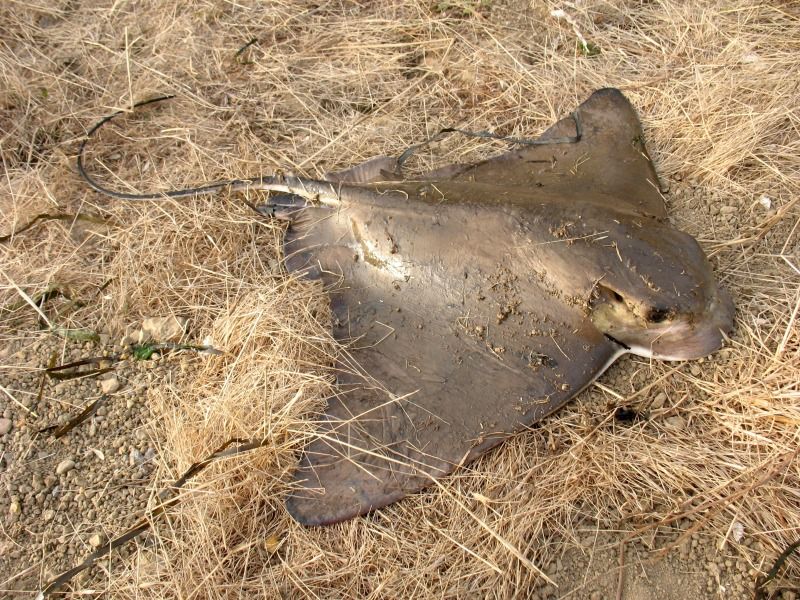
Eric’s next cast must have soaked for just a few minutes before it was picked up again. However, he missed this hit. I got another hit next that was missed again.
About another 10 minutes later, Eric’s bait got picked up and he reared back to really hammer to hook home. The fish started charging out to deep water as Eric handed the rod to me. With the shorter rod, I had better leverage. Maybe this fish didn’t have the same stamina, or maybe it really was the leverage of the shorter rod, but this fish also came in with much more ease than my first fish. It still put up a long, determined fight but we landed the fish relatively quickly. As the tide was flooding the little bit of the rocky beach we had, we hoisted the fish up the steep slope to unhook the fish. This was a 41” Bat Ray that was thicker in body.
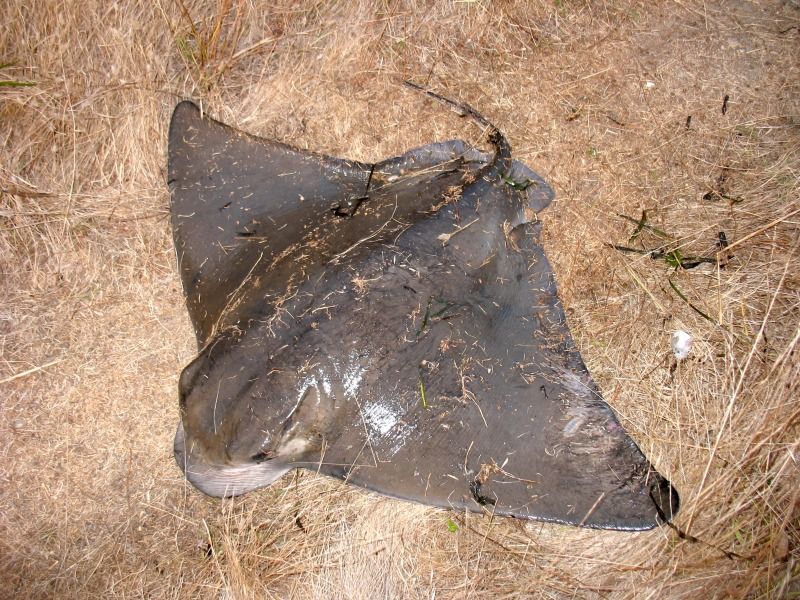
I decided to rub its melon. They are such cool fish!
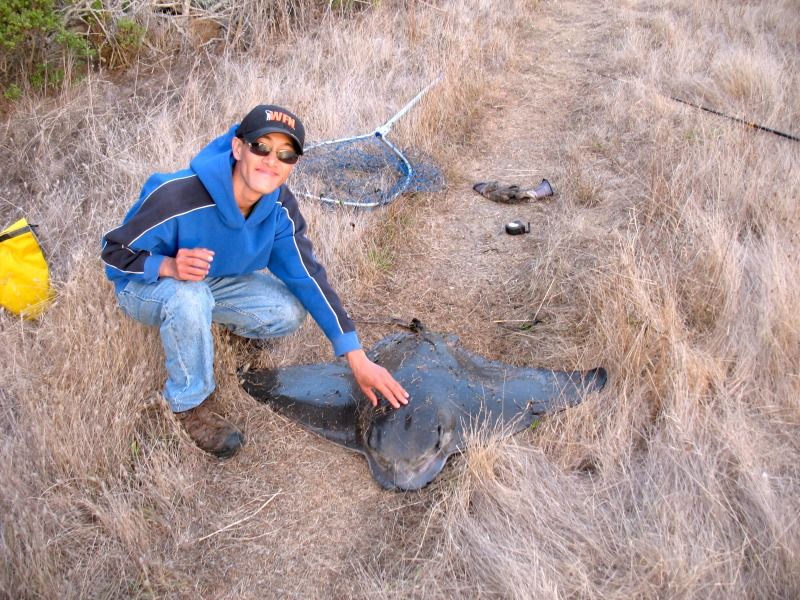
After landing 3 bat rays, I had enough. Eric was right – these fish will kick your butt and three was about all you can handle. At 8pm, merely just one hour after we started fishing, we called it a night. Eric took me to a great little restaurant and I treated him to dinner. It was really a very small thank you for such a great fishing session.
That night, I got back to the motel at about 12am. I was completely exhausted. I had planned to fish the next morning, but my body was refusing to comply. I decided to go to sleep and decided the next morning.
July 30 – Day 5 – Day at UC Berkeley
Well, unless you really want to hear all about touring UC Berkeley, I’ll just do a short little recap. My body didn’t allow me to do any morning fishing session. Plus, I would have to rush to Berkeley by 12pm to meet my friend. I didn’t like to rush.
I met my friend Melissa at a microscopy course last October at Woods Hole. She manages a microscopy core at their vision center and we met up for lunch and a tour of Berkeley and her microscopes. The little lunch café was rather busy, so we decided to take out our lunch and ate at Indian Rock instead. Indian Rock is a large rocky outcrop just a little drive from Berkeley. It offered a nice view…but my camera didn’t want to cooperate with any good pictures. It was just a bit hazy to really get any good pics.
After lunch, Melissa took me around Berkeley.



I saw some of the microscopes she manages. She was building a 2-photon from scratch, with the light path mounted on a stand made of metal rods instead of a typical microscope stand…and the entire light path was actually on a motorized track to scan across the sample rather than using a motorized stage. It was pretty interesting to say the least. No pictures taken since some of the things she was working on were proprietary.
I was just great to see a friend again. Our 3 short hours together ended too soon.
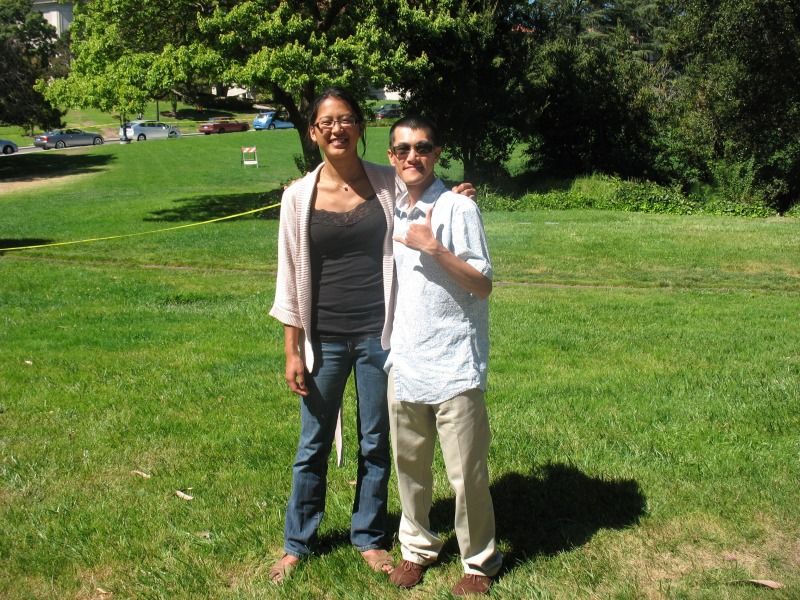
After visiting Berkeley, I drove around to take some token pictures…
Bay Bridge from Treasure Island
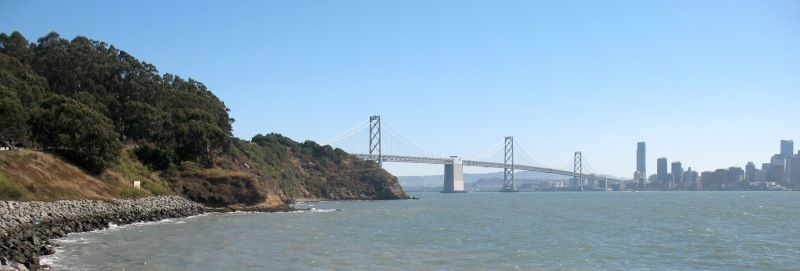
Fisherman’s Wharf

Steep streets

Golden Gate Bridge
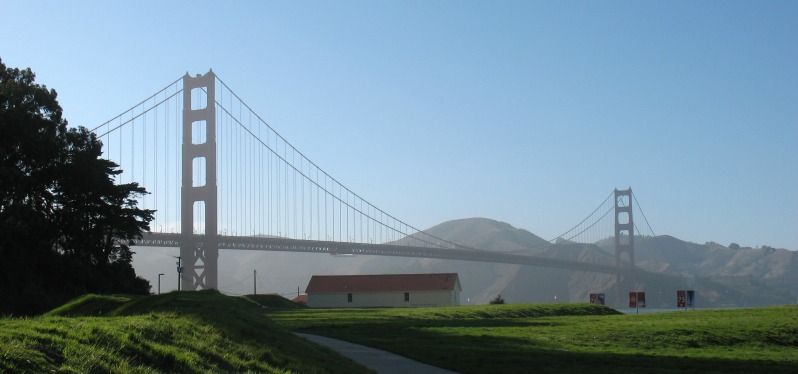
The afternoon before, I was driving along Highway 1 admiring the scenery. I was on a rush to get to Eric’s house and didn’t have time to stop. I decided to drive back to Half Moon Bay along Highway 1 to take some pictures. I liked this one the best. That is a guy surf fishing. I didn’t see him hook up…and thus I kept the gear in the car LOL.
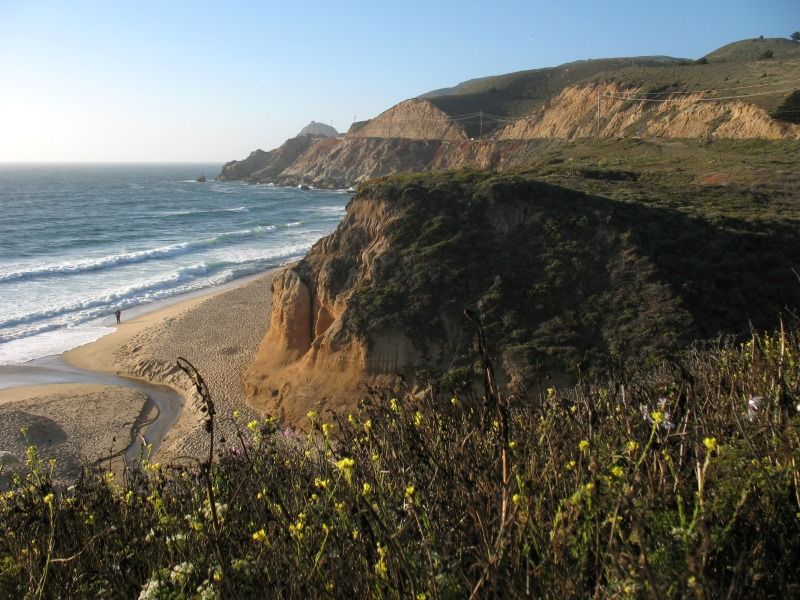
By the time I returned to Half Moon Bay, the sun was already setting. This was my last evening at Half Moon Bay and I really wanted to put in an effort to catch a grass rockfish. I hiked out on the South Jetty again and got about halfway before I lost light. My headlamp was not too bright, so for safety sake, I decided to stop hiking out and fished in the middle of the jetty. I tried the Gulp! Shrimp on jighead for a while, but soon lost the lure to the hungry rocks below. It was hard judging where the rocks would start in the dark. I decided to just soak some squid strips by the rocks on a dropshot rig to see if anything was around. I didn’t get any hits close to the rocks. I did get a decent bite out further and it was a White Croaker.
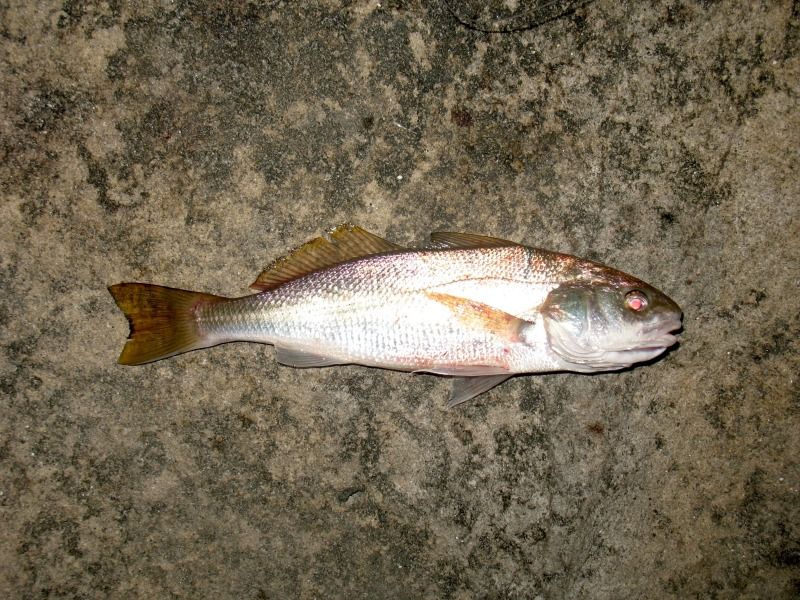
That was all she wrote that night. By 10pm, I decided to hike out and grab some McD’s dinner. It was still a little early to go to bed, so I hung out at McD’s until closing to catch up using their WiFi.
I scheduled a trip on the Queen of Hearts out of Half Moon Bay Sportfishing for the next day. Since they were leaving fairly early, I had planned to sleep in their car at the parking lot so I didn’t have to bother with packing and driving the next morning. At the parking lot, I rigged up a couple of rods and tied up a couple of dropper loop rigs. With everything ready, I turned off the light and settled into the backseat of the car. Seriously, it wasn’t that day. I’m a small guy…lots of room LOL.